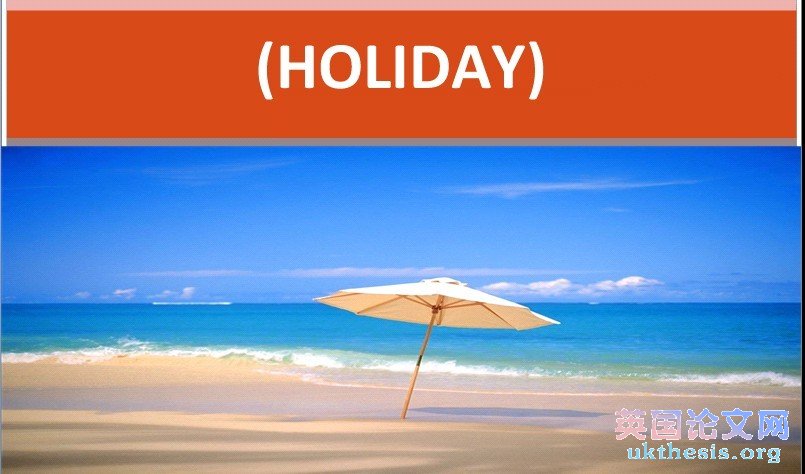英国留学生旅游市场管理dissertation需求-Horizontal-Mergers-Tour market in UK are seg

11-21, 2011
Horizontal-Mergers Ⅱ
Merging

Airtours proposed to merge with First ChoiceSupply of leisure travel services to customers in the United Kingdom and Ireland and supplying package tours and certain other holiday products, they are also both vertically integrated into upstream (airline operation) and downstream (travel agency) businesses.
Market Definition
Short-haul package holidays: Accommodation and possibly other services in a given (usually foreign) destination with return travel (usually by air) to and from it.Independent holiday: customer are more familiar with the tour and the transparency of the information increase.
Short-haul v.s Long-haul
Market structure
Market-structure comprising-four large tour Operators-each vertically integrated both upstream into charter airline operation and downstream into travel agency and together accounting for the large majority of salesAccording to Airtours there are two ways of doing business in this industry. Either stay small and buy inputs or produce large volumes and integrate vertically
Tour Package
Domestic and foreign tour package Domestic dominance.Long-haul and short haul-difference between travel flight timeLong haul-Asia and AmericaShort haul- holiday-all European (mainland and islands) and North African.
Tour market in UK are segment. Market Share:
Leading Companies Market share
30.7%
20.4%
19.4%
15%
The 4 main companies control over 80% of the market.
Vertical Integration
4 large firms are operated in vertical integration-From their airlines to local distribution channel: Upstream channel-individual airline(First Choice has one of the largest charter airlines ) Downstream-distribution channel (a chain of distribution channel)
Market characteristics
Market characteristics-oligopolistic dominance conducive to the creation of a collective dominant position.Only the four main integrated players.Capacity expansions are highly risky (the nature of the product, the moderate growth of the market, and the level of transparency)
Product homogeneity
Fundamentals are similarAll involve packaging of travel and accommodationDepend on bulk buying
Low demand growth
Not essential item for consumer spendingLow economic situation in UKMarket growth are moderate
Low price sensitivity
Overall package price increase-not affect the initiative of the customerLimit the output is available
Similar cost structures
Economies of scale is set at a max by around 15-20 aircrafts – Prof. NevenThe Four major firm have a larger number of aircrafts than the limit.Similar marketing and distribution channel.
Barrier to entry
Airtours has suggested that entry barriers into tour operation, charter airline operation and travel agency are all insignificant.The absence of regulatory constraints The occurrence of entry and exit in tour operation and airline operation.The low financial outlay requiredThe primary barriers to entry/expansion are -airline seats and the distribution through travel agencies.Small tour companies usually pay a commission to the 4 large operators for capacity.#p#分页标题#e#
Transparency
Mutual dependency between the operators in the market.Merger increase the link of transparency-increase mutual dependency.The number of bilateral linksIncentive to restrict capacity
Buyer power
Individual consumers have no buyer power-most holidays are sold by travel agencies Moreover, other market imperfections, such as inadequate information to consumers on the links between agencies, operators and airlines.The difficulty of comparing competing products from the limited information available in tour operators brochures.Nature of holiday purchases.
Way of doing business
Tour operators need to operate at high levels of capacity utilisation (95% or more)Preparation time is long.Encourage early booking- cash flow, reduce riskHigh fixed cost-high discount for the late comers(25% off)
Commission decision
29/04/1999: The Commission received a notification of a proposed concentration pursuant to Article 4 of Regulation (EEC): Airtours plc. acquires the whole of First Choice plc03/06/1999: The Commission decided to initiate proceedings in application of Article 6(1)(c) of the Merger Regulation. The Commission therefore blocked the merger.
Commission decision
Commission blocked the proposed merger between Airtours and First Choice Holidays plc in 9/1999Because it will cause collective dominant for short-haul foreign package holidays in UK, where such positive didn’t exist before.06/2002, Court of First Instant (CFI) annulled the commission decision.
Economic Theory
Coordinate Effect (Tacit collusion) Collective Dominance Unilateral Effect
The effects of a merger
Two types of possible effectsCoordinated effects: arise if the merger results in an likelihood of tacit collusion.Unilateral effects: arise from an individual incentive for the merged entity to raise prices post merger.
Coordinated Effect – Tacit Collusion
Two main reasons why a merger might favour the creation of collusive outcomes:1) A merger reduces the number of firms.2) A merger might give rise to a more symmetric distribution of assets.
Coordinated effect is all about tacit collusion:Tacit collusion occurs when two or more firms agree to play a certain strategy without explicitly saying so. They may then be able to maintain higher prices by tacitly agreeing that any deviation from the collusive path would trigger some retaliation.Airtours/First Choice and Thomas Cook after the merger. According to Airtours it would, because the nature of the product makes it impossible to tacitly coordinate on price and there would in any case be numerous possibilities to cheat on the tacitly agreed prices.
Definition: A few firms own a high market shares in an oligopolistic market but cant individually dominant. After a merger, the firms avoid a strong competition in the market.A merger can alter the market structure in order to help the undertakings create a dominant position in an oligopolistic market. It has diverse forms of the collective dominance. For exampleCorrespond the priceLimit the productionDivide the market#p#分页标题#e#英国留学生旅游与市场管理dissertation写作需求
Evaluate the risks of Collective dominance
Market concentrationSymmetryStabilityStructural LinksProduct Homogeneity
Evaluate the risks of Collective dominance
InnovationMarket TransparencyRetaliationEntry BarriersBuyer Power
A transaction is unlawful if it creates or strengthens a dominant positionTacit Collusion from dominant playersReduce capacity -> Increase Prices -> Reduce Welfare
Market concentrationSymmetryStabilityStructural LinksProduct Homogeneity
如果您有论文代写需求,可以通过下面的方式联系我们
点击联系客服